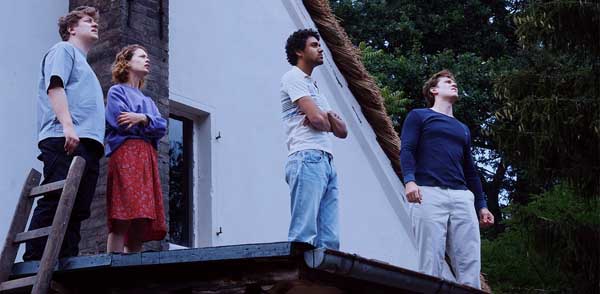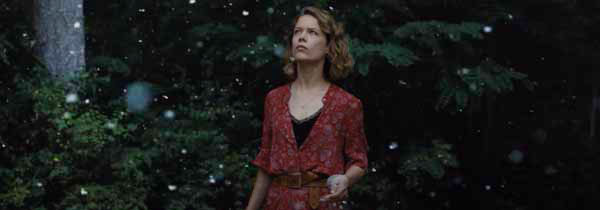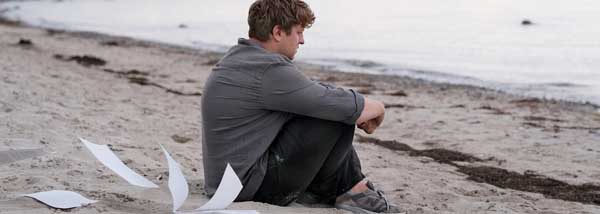Filmmakers, Screenwriters, Performance, Reviews, Film Reviews, Streaming

AFIRE
“Something’s not right,” is the first dialogue we hear in Christian Petzold’s extraordinary new film “Afire,” his tenth feature and easily one of his best. These portentous words — spoken by a photographer named Felix (the sexy and genial Langston Uibel) who’s traveling with his novelist friend Leon (the marvelously brooding Thomas Schubert), to a vacation home on the Baltic Sea — comes just moments before their car breaks down, forcing the young men to load up their belongings and trek through the dense woods like characters out of a fairy tale. This being a Petzold film, the abandoned car will eventually circle back into the plot for maximum impact: As a creator of intricately finessed dramas where not one drop of story goes to waste, Petzold has few peers. The twenty-something men are seeking isolation in order to finish their separate projects. For Leon it’s a sophomore novel (after the success of his first); for Felix it’s an undergraduate photo-essay thesis about the ocean. But upon arriving at the quaint seaside home, they discover that a version of Goldilocks (Petzold regular Paula Beer, marvelous as ever) has been sleeping in one of the beds and leaving strewn clothes about the place — along with half a lasagne on the dinner table. This intrusion starts to shatter the genial dynamic between the friends, and when a fourth character enters the picture — Devid, a hunky lifeguard played with openhearted sincerity by Enno Trebs (”Undine”) — the already frustrated Leon goes in to full on curmudgeon mode, purposely denying himself any possibility of fun. It’s a Chekovian scenario with the requisite amount of unrequited (and very requited) love — where the expertly woven score-keeping nuances of social and sexual interaction make for an unexpected cinematic delight. Funny, honest and ultimately heart rending, “Afire” is that rarest of creatures: a perfect Summer movie. Adding to the drama is the encroaching menace of an enormous wildfire burning out of control on the other side of the forest. In a gorgeously shot scene, the quartet stand on the roof of the house and watch the orange glow from the fire as it lights up the horizon: They can see the danger, and yet they stay.
It’s a neat metaphor for climate change that never becomes didactic or intrusive. Petzold — like Albert Serra with “Pacifiction” and Ari Aster with “Beau is Afraid” — has found an effective way to elucidate our global disquiet by transforming it into palpable art. The act of creation is also on his mind, seen through the eyes of the two young men who go about their projects in decisively different ways: Felix using art as a way to connect and dour Leon as a way to disconnect. Felix trusts his instincts, shares his insights and bubbles over with the fervent joy of photographic discovery. Whereas Leon isolates, constantly opting out of any group fun because of his need to work. Or, rather, his need to appear to be working. Invariably when left on his own, he ditches the manuscript and spends hours mindlessly bouncing a ball off the roof. This depiction of the foot-dragging misery of artistic malaise has rarely been portrayed with more heart-breaking and hilarious accuracy. Leon is angry with himself for not living up to his own expectations but his isolation is only feeding his inability to recreate the success of his earlier book. His self-centeredness is keeping him from having the life-altering experiences any artist needs in order to create. At one poignant moment near the end of the film, Beers’ character Nadja lashes out at Leon: “Do you see anything happening around you!?” The answer, sadly, is no. Watching Thomas Schubert’s seething and frustrated performance as Leon provided a deeply personal experience for me. Swap out his brown locks for blonde curls and he could be my 25-year-old doppelganger. Like Leon, I also refused to go swimming no matter how many times I was asked. And though Petzold doesn’t make a big deal out of it, we know the reason why Leon doesn’t want to put on a bathing suit: he’s ashamed of his body. Felix is lithe and Devid is well-muscled and they both have that casual ability to walk around shirtless. But Leon is large and soft. He never takes off his long sleeved shirt and pants, even wearing them to the beach on a hot day. And this self-loathing seeps into how he relates with other. When Nadja, who he clearly has a crush on, practically begs him to walk down to the beach with her at night to see the bioluminescent ocean, he says no. Recalling my own inability — at that age — to believe anyone would actually want to spend time with me brought a hot flush of sympathetic shame to my face.
Though “Afire” is gorgeous to look at — Hans Fromm’s crystalline cinematography is particularly stunning — Petzold is above all a brilliant writer: His dialog here is as vivid and lacerating as a Bergman film And he pulls off the supremely daunting trick of offering up wholly convincing passages from Leon’s disastrous sophomore novel, called idiotically enough “Club Sandwich.” In these marvelous and cringe-worthy examples of well-intentioned but wildly unsuccessful prose-writing, we recognize Leon’s obvious talent even as it’s being repeatedly swamped by his over-thought penchant for the kind of cliché writers fall back on when uninspired, or when reaching for something outside their ken. Matthias Brandt (”Transit”) as Helmut, Leon’s publisher, gives a comically deft and compassionate performance, showing up to read “Club Sandwich” aloud in the hopes of making Leon realize just how ‘not good’ it is. His recitation of the line “The sweat of night glistened in her cleavage,” and Leon’s resulting look of nascent understanding is a moment of bittersweet perfection. But it’s the incandescent Paula Beer, with her enigmatic smile and watchful, knowing gaze, who holds the beating heart of the film in her capable hands. From the moment she walks on screen we, like poor Leon, are utterly smitten. In the world of cinema, Petzold is as close as we get to a sure thing. Of the eight films of his I’ve seen, all are undeniably great and three — “Barbara” (2012) “Phoenix” (2014) and “Transit” (2018) — qualify as out and out classics. He is meticulous in how he works out the threads of his plot, side-stepping what could become melodrama in less capable hands by instilling the action beats, no matter how seemingly implausible, with utter authenticity. His world-building — even when creating alternate universes where fascists occupy modern day France (”Transit”) or water spirits become involved with humans (”Undine”) — is always accomplished with clarity, brevity and the inevitability of lined-up dominoes falling. And he writes and directs with a compassionate detachment, as if watching his characters from afar. You can sense the absolute love he shares for them but also the utter helplessness of not being able to save them from their fate. He is in the upper echelon of greatest living directors. And “Afire” is among his best. IN THEATERS |
|
An LA-based playwright, JUSTIN TANNER has more than twenty produced plays to his credit, including Voice Lessons, Day Drinkers, Space Therapy, Wife Swappers, and Coyote Woman. His Pot Mom received the PEN-West Award for Best Play. He has written for the TV shows Gilmore Girls, My So-Called Life and the short-lived Love Monkey. He wrote, directed and edited 88 episodes of the web series Ave 43, available on YouTube. Tanner is the current Playwright in Residence for the Rogue Machine Theatre in Hollywood, where his new play Little Theatre, of December of 2022, was met with rave reviews. Charles McNulty of the LA Times writes, "Engrossing... a comedy à clef... “Little Theatre” is invaluable.'"
|

To receive a free subscription to our Sunday Lounge! newsletter, Click Here
Have a suggestion? Send an email to the Editor, Click Here










